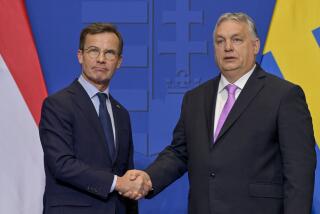E. Germany Eases Stance on Unification
- Share via
BONN — East German Prime Minister Hans Modrow, in a significant shift in policy, declared Sunday that neutrality is not necessarily a condition of German reunification.
Speaking to West German television and Swiss TV on Sunday at the World Economic Forum in Davos, Switzerland, Modrow said that his previous insistence on neutrality for a unified Germany is really a matter “for discussion.”
“The idea for Germany to be militarily neutral was put forward for discussion,” he told a Swiss interviewer in the mountain resort. “It was not regarded as something hard and fast.”
The Communist leader’s startling change came after he and Soviet President Mikhail S. Gorbachev apparently agreed in principle in Moscow last week to German reunification--but only if a new Germany was not a member of the Western military alliance.
The concept of a neutral Germany was promptly turned down by West German Chancellor Helmut Kohl and other leading members of the North Atlantic Treaty Organization.
Modrow’s meeting with Kohl on Saturday at the annual conference of businessmen and economists seems to have persuaded the East German leader to soften his stance--particularly in view of the economic and political chaos his country faces.
Kohl said that Modrow did not raise the neutrality issue when they met. Referring to that question, the chancellor said later: “The biggest mistake we could now make, from all Europeans’ point of view, would be to give the Germans a special status again. That has contributed to too much suffering this century.”
For the first time, two other East European leaders attending the Davos conference supported German reunification: Poland’s President Wojciech Jaruzelski and Peter Medgyessy, vice chairman of Hungary’s Council of Ministers.
Jaruzelski said that Poland’s main concern is that a reunited Germany would recognize the current border along the line of the Oder-Neisse rivers.
“If these requirements are met,” said the Polish leader, “we can treat the question of unification of Germany as the right that every nation has to self-determination.” Medgyessy agreed.
East Germany’s Modrow, looking aged at 61, told West German television that in calling for neutrality he was only “offering this as something to be considered for discussion.”
“I cannot expect to make a suggestion and have it greeted with celebration, with everyone saying, ‘That’s exactly how it must be.’ ”
The diplomatic community here read Modrow’s remarks as an even firmer indication that the headlong rush toward German reunification cannot be stopped by Communist insistence on the nation’s neutrality.
That rush gained impetus when Kohl said in Davos that he was ready to begin talks on a German “fatherland” immediately after the first free election in East Germany, now scheduled for March 18.
And Kohl also discussed with Modrow plans for a speedy economic and monetary union that both leaders hope will stem the 2,000-a-day hemorrhage of East Germans fleeing to West Germany for a better life.
Kohl will go into greater detail on the issue with Modrow in two days of formal meetings in Bonn next week.
West Germany is prepared to undertake a massive underwriting of the East German economy once a democratically elected regime is in place--but many diplomats say that the March voting will lead to a quick East German referendum on reunification.
Once that happens, German unity will be a fact of life, and it will be left to an international conference, most probably in Vienna, to spell out the legalities with the World War II occupying powers--the United States, the Soviet Union, Britain and France.
Meanwhile in Munich, NATO Secretary General Manfred Woerner, a former West German defense minister, declared Sunday that a reunited Germany must stay in NATO to prevent a political vacuum from developing in Central Europe.
A neutral Germany would not serve the interests of West or East Europe, Woerner told a defense conference, but a united Germany as a leading member of NATO would serve as a stabilizing force, he said.
“Even though the Warsaw Pact may dissolve, it need not lead to NATO dissolving,” said Woerner. “On the contrary, our role as a stabilizing factor can be even greater.”
West German participants in the conference indicated that NATO forces would not operate in the eastern part of a united Germany--in order not to provoke the Soviet Union and Poland.
Karsten Voigt, a defense specialist for West Germany’s opposition Social Democratic Party, said that East German territory would be kept clear of allied troops, declaring:
“This is also a question of self-determination. No political party in East Germany is in favor of NATO extending into East Germany.”
U.S. Gen. John Galvin, NATO’s supreme military commander, suggested that a special NATO formula could be arranged for positioning troops in a reunited Germany.
He referred to the fact that France withdrew its forces from the integrated structure of the 16-member alliance in peacetime, and that Denmark and Norway do not permit nuclear weapons to be based within their borders.
“I don’t myself, being a soldier and not a politician, see any real problems that we cannot overcome,” said Galvin, “especially since I know that there has been a change in the Soviet Union.”
More to Read
Sign up for Essential California
The most important California stories and recommendations in your inbox every morning.
You may occasionally receive promotional content from the Los Angeles Times.













